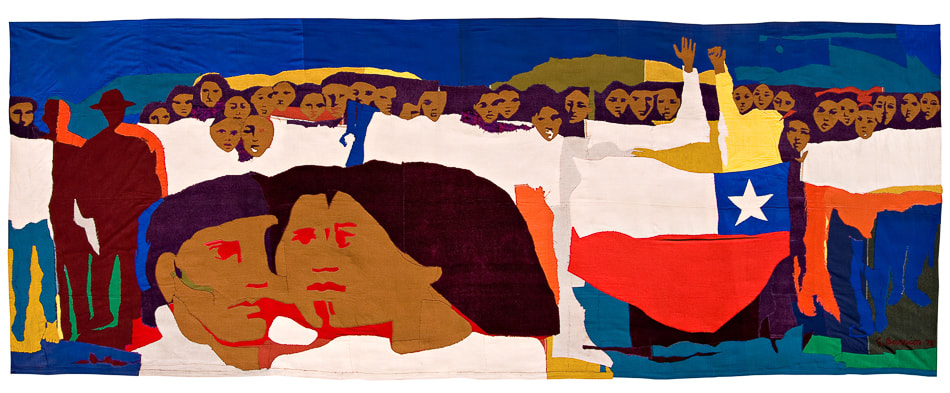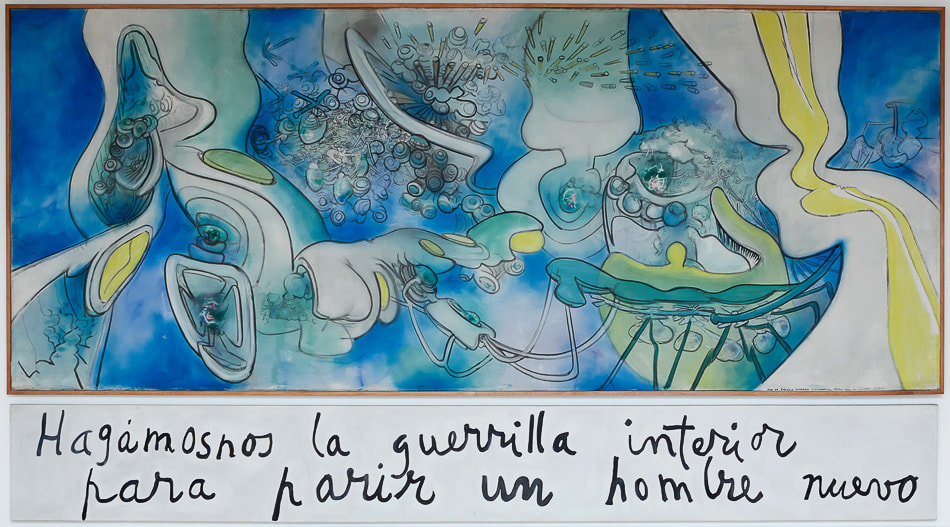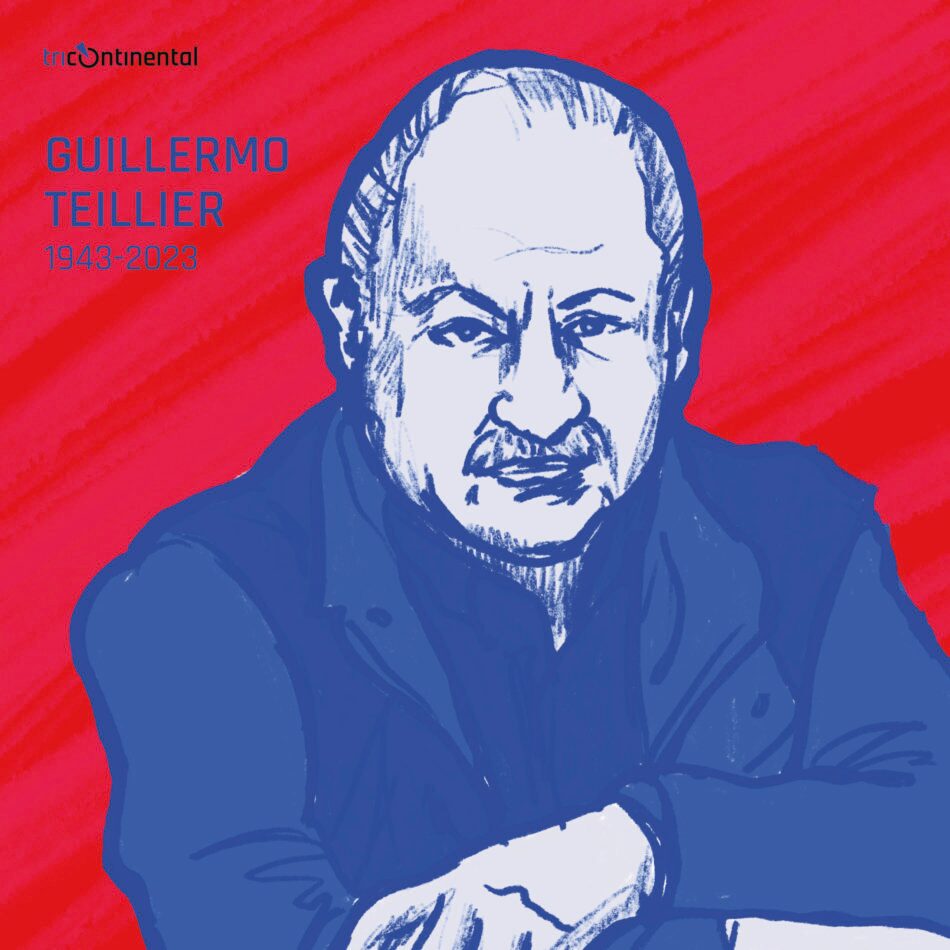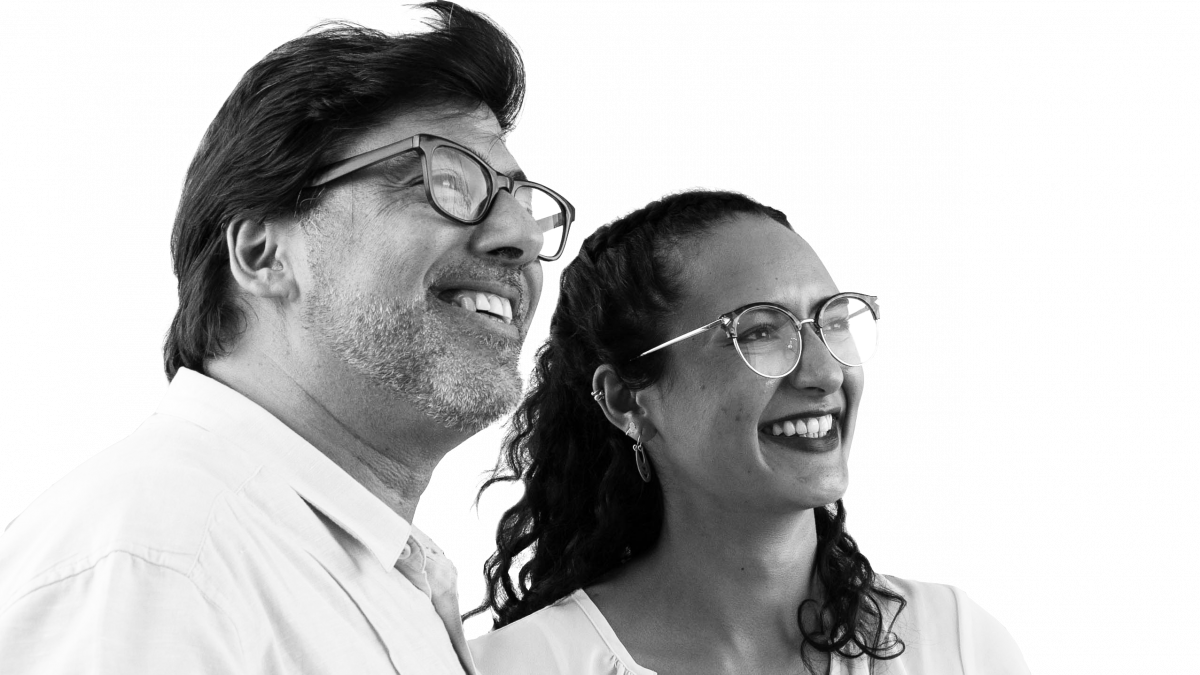|
9/12/2023 What if There Had Been No Coup in Chile in 1973?: The Thirty-Sixth Newsletter (2023) By: Vijay PrashadRead NowGracia Barrios (Chile), Multitud III (‘Multitude III’), 1972. Dear friends, Greetings from the desk of Tricontinental: Institute for Social Research. Imagine this scenario. On 11 September 1973, the reactionary sections of the Chilean army, led by General Augusto Pinochet and given a green light by the US government, did not leave their barracks. President Salvador Allende, who led the Popular Unity government, went to his office in La Moneda in Santiago to announce a plebiscite on his government and to ask for the resignation of several senior generals. Then, Allende continued his fight to bring down inflation and to realise his government’s programme to advance the socialist agenda in Chile. Until the moment when the Chilean Army descended upon La Moneda in 1973, Allende and the Popular Unity government were in a pitched fight to defend Chile’s sovereignty, particularly over its copper resources and its land as they sought to raise sufficient funds to eradicate hunger and illiteracy and to produce innovative means to deliver health care and housing. In the Popular Unity programme (1970), the Allende government founded its charter: The social aspirations of the Chilean people are legitimate and possible to satisfy. They want, for example, dignified housing without readjustments that exhaust their income; schools and universities for their children; sufficient wages; an end once and for all to high prices; stable work; timely medical attention; public lighting; sewers; potable water; paved streets and sidewalks; a just and operable social security system without privileges and without starvation-level pensions; telephones; police; children’s playgrounds; recreation areas; and popular vacationing and sea resorts. The satisfaction of these just desires of the people – which, in truth, are rights that society must recognise – will be a preoccupation of high priority for the popular government. Realising the ‘just desires of the people’ – a laudable objective – was possible amidst the public’s optimism for the Popular Unity government. Allende’s administration adopted a model that decentralised the government and mobilised the people to attain their own ‘just desires’. Had this model not been interrupted, the depositors in the government’s social security institutions would have remained on directive councils with oversight of these funds. Organisations of slum dwellers would have continued to inspect the operations of the housing department tasked with building quality housing for the working class. Old democratic structures would have continued to strengthen as the government used new technologies (such as Project Cybersyn) to create a distributed decision system. ‘It is not only about these examples’, the programme noted, ‘but about a new understanding in which the people participate in state institutions in a real and efficient way’. Roberto Matta (Chile), Hagámosnos la guerrilla interior para parir un hombre nuevo (‘Let’s Fight the Guerilla War Within Ourselves to Give Birth to a New Man’), 1970. As Chile’s people, led by the Popular Unity government, took control over their economic and political lives and worked hard to improve their social and cultural worlds, they sent a flare into the sky announcing the great possibilities of socialism. Their advances mirrored those that had been attained in several other projects, such as in Cuba, and boosted the confidence of people across the Third World to test their own possibilities. The eradication of poverty and the creation of housing for every family was an inspiration for Latin America. Had the Popular Unity project not been cut short, it very well might have encouraged other left projects to demand the satisfaction of just desires in a world where it was possible to attain them. No longer would we live in a world of scarcity, which impedes the realisation of these desires. No Chicago Boys would have arrived with their noxious neoliberal agenda to experiment in the laboratory of a military regime. Popular mobilisations would have exposed the illegitimate desire of the capitalist class to impose austerity on the people in the name of economic growth. As Allende’s government expanded its agenda, driven by a decentralised government and by popular mobilisation, the ‘just desires’ of the people might have eclipsed the narrow greed of capitalism. If there had been no coup in Chile, there might not have been coups in Peru (1975) and Argentina (1976). Without these coups, perhaps the military dictatorships in Bolivia, Brazil, and Paraguay would have withdrawn in the face of popular agitation, inspired by Chile’s example. Perhaps, in this context, the close relationship between Chile’s Salvador Allende and Cuba’s Fidel Castro would have broken Washington’s illegal blockade of revolutionary Cuba. Perhaps the promises made at the UN Conference on Trade and Development (UNCTAD) meeting in Santiago in 1972 might have been realised, among them the enactment of a robust New International Economic Order (NIEO) in 1974 that would have set aside the imperial privileges of the Dollar-Wall Street complex and its attendant agencies, the International Monetary Fund (IMF) and the World Bank. Perhaps the just economic order that was being put in place in Chile would have been expanded to the world. But the coup did happen. The military dictatorship killed, disappeared, and sent into exile hundreds of thousands of people, setting in motion a dynamic of repression that has been difficult for Chile to reverse despite the return to democracy in 1990. From being a laboratory for socialism, Chile – under the tight grip of the military – became a laboratory for neoliberalism. Despite its relatively small population of roughly ten million (a tenth of the size of Brazil’s population), the coup in Chile in 1973 had a global impact. At that time, the coup was not just seen as a coup against the Popular Unity government of Salvador Allende, but as a coup against the Third World. That is precisely the theme of our latest dossier, The Coup Against the Third World: Chile, 1973, produced in collaboration with Instituto de Ciencias Alejandro Lipschutz Centro de Pensamiento e Investigación Social y Política (ICAL). ‘The coup against Allende’s government’, we write, ‘took place not only against its own policy of the nationalisation of copper, but also because Allende had offered leadership and an example to other developing countries that sought to implement the NIEO principles’. At the third session of UNCTAD in Santiago (1972), Allende said that the mission of the conference was to replace ‘an obsolete and radically unjust economic and trade order with an equitable one that is based on a new concept of man and human dignity and to reformulate an international division of labour that is intolerable for the less advanced countries and that obstructs their progress while favouring only the affluent nations’. This was exactly the dynamic that was derailed by the coup in Chile as well as by other manoeuvres of the imperialist bloc. Instead of promoting an order ‘based on a new concept of man and human dignity’, these manoeuvres resulted in the murder of hundreds of thousands of people’s advocates (among them leftists, trade unionists, peasant leaders, environmental justice campaigners, and women’s rights activists) and prolonged the destiny of hunger and illiteracy, poor housing and medical care, and the general orientation of a culture of despair and toxicity. Please read our dossier and share it. These dossiers – produced once a month – are a product of collaboration and hard work, a synthesis of how we, as an institute rooted in popular movements, see key events of our history. The art for this dossier comes from the Salvador Allende Solidarity Museum, which preserved art from the Popular Unity period and from the struggle against the coup. We are grateful to them, and to ICAL, for our collaborations based on solidarity and against the neoliberal ethic of parochial greed. Two weeks before the fiftieth anniversary of the coup in Chile, Guillermo Teillier, the president of the Communist Party of Chile (PC), died. At his funeral, the party’s general secretary Lautaro Carmona Soto described how Teillier – with the coup’s cordite still in the air – went to work in Valdivia to protect and then build the party as part of the broader resistance to the coup regime. In 1974, Teillier was arrested in Santiago and subsequently held and tortured for two years in the Academia de Guerra Aérea. For another year and a half, Tellier was held in concentration camps in Ritoque, Puchuncaví, and Tres Álamos. Released in 1976, he went into hiding and continued to build the party back to its fighting strength, joined the following year by PC leader Gladys Marín. This was dangerous work, made even more dangerous when Tellier took over as the leader of the party’s military commission, which managed the aid sent from Cuba to Chile and oversaw the creation and operations of the Manuel Rodríquez Patriotic Front (FPMR), the PC’s armed wing. Though attempts to assassinate Pinochet failed, broader work to build the movement for democracy succeeded. It is the bravery and sacrifice of people such as Tellier, Marín, and countless – and often nameless – others, that brought the dictatorship of Pinochet and the Chicago Boys to an end in 1990. The 1973 coup in Chile destroyed lives and suspended a process of great promise. Today, that promise must be revived. Warmly, Vijay AuthorVijay Prashad is an Indian historian, editor, and journalist. He is the chief editor of LeftWord Books and the director of Tricontinental: Institute for Social Research. He is a senior non-resident fellow at Chongyang Institute for Financial Studies, Renmin University of China. He has written more than 20 books, including "The Darker Nations" and "The Poorer Nations." His latest book is "Washington Bullets," with an introduction by Evo Morales Ayma. This article was produced by triContinental. Archives September 2023
0 Comments
The recent victories of the left in a number of municipalities and in elections for the Constitutional Convention have set the stage for a categorical rejection of the legacy of the Augusto Pinochet dictatorship and the building of a new Chile Daniel Jadue and Javiera Reyes Javiera Reyes, who is 31 years old, is the new mayor of the Santiago municipality of Lo Espejo in Chile. “I grew up in a home where [former President of Chile] Salvador Allende was always the good guy,” she told us, “and [military dictator] Augusto Pinochet was a tyrant. That marked my life.” Reyes’ comment reflects the old divides that have convulsed Chile’s politics since General Augusto Pinochet’s coup d’état against former President Salvador Allende of the Popular Unity coalition on September 11, 1973. Almost 50 years have gone by and yet Chile is still influenced by the legacy of that coup and of the Pinochet dictatorship, which lasted from 1973 to 1990. The May 2021 election that propelled Reyes to the mayor’s office in Lo Espejo also voted in a new Constitutional Convention to rewrite the Pinochet-era Constitution of 1980. Reyes’ victory and the gains made by the left alliance to shape the new Constitution suggest that it is Allende’s legacy that will shape the future and not that of Pinochet. Reyes is a member of the Communist Party of Chile (PCCh), which has rooted itself deeply in Chile’s society over the past 109 years. A PCCh leader--Daniel Jadue—will be the left’s candidate in the presidential election to be held in November 2021. Jadue, like Reyes, is a mayor of a municipality in Chile’s vast capital city of Santiago (a third of Chile’s 18 million people live in Santiago). In the May 2021 election, he was re-elected to the mayoralty of Recoleta, which he has governed since 2012. “There is a historical continuity in [PCCh’s] policy,” Jadue told us, “with the same horizon—updated, of course. No one is thinking of taking up statist projects [again] or socialism as it has been tried, but there is undoubtedly a historical continuity, and we are in one way or another participants in the dream of the people who in the 1970s sought to build a fairer country and who today seek exactly the same thing.” Vote without fearJadue leads in the November 2021 general election polls to replace Chile’s right-wing President Sebastián Piñera. Already, the press has started reporting about the various stances taken by Jadue during his life, particularly his association in the 1980s with Palestinian activism. The smearing of candidates of the left has become part of the electoral process in Latin America: the extreme-right press in Ecuador said that the left-leaning candidate for president, Andrés Arauz, had taken money from the Colombian left-wing guerrilla group ELN (National Liberation Army). The right-wing press also reported that Peru’s current presidential candidate Pedro Castillo, who is leading by a narrow margin, was similar to Sendero Luminoso (Shining Path), which is a guerilla insurgency in Peru. Jadue dismisses these claims made against the leftist candidates. “I want my entire record to be visible because I have nothing to hide,” Jadue said when he spoke to us. The communists participated in the elections held on May 15 and 16 under the slogan Vote Without Fear (Vota Sin Miedo). This slogan comes from a long history, which is part of the party’s legacy. The PCCh was banned, and its members were subjected to persecution over three periods: 1927-1931, 1948-1958, and 1973-1990. Pinochet’s dictatorship killed thousands of communists, including many key leaders. A swath of Chile’s society was gripped by fear brought about by Allende’s socialism, which was essentially a result of the hatred cultivated during Pinochet’s dictatorship. During this time, it takes courage to stand with the communists. Fear of communism has been diminishing, Reyes told us, because the PCCh elected officials have shown their constituents efficiency and compassion through their governance. Jadue’s Recoleta has become a showcase, with a municipal pharmacy, optical shop, bookstore and record store, open university, and real estate project operating free of any profit motive under Jadue’s vision as the mayor of the municipality. Javiera Reyes says that her communism is rooted in her “conception of a municipal government that starts with the universalization of rights and the capacity to create conditions for a good life.” The project of municipal socialism starts with “health, education and common spaces,” says Reyes. It is a project that is “democratic and open to the community.” Unlike Chile’s right-wing mayors, the communist mayors in Santiago such as Reyes, Jadue and Iraci Hassler (who was elected in May 2021 to the mayoralty of Santiago Centro) put the role of women at the core of their policies, including mechanisms to tackle violence against women. They want to create a society without fear in the broadest sense possible. Penguin RevolutionIn 2006, students across Chile protested the privatization of education. Their mass struggle was called the Penguin Revolution because of their black-and-white school uniforms. “The Penguin Revolution in 2006 was my first [introduction] to politics,” Reyes told us. Reyes and Hassler both participated in the massive protests in 2011 and 2013 over the inequalities that marked the secondary and university education in the country. Reyes joined the PCCh during that period. Other students who are currently Chilean politicians, such as Camila Vallejo and Karol Cariola as well as Hassler, were already communists. Student demonstrations came alongside manifestations and strikes by workers from all sectors. Their protests rattled the elite consensus, which since the fall of Pinochet in 1990 had not attempted to write a new Constitution for the country or bothered to formulate a path out of neoliberal suffocation. In October 2019, high school students protested the rise of fares for public transport. This wave of protests, which is ongoing, began to define Chile’s political life. With the slogan “it’s not 30 pesos, it’s 30 years,” the students have highlighted the need for a new Constitution. A new ChileChile has the lowest electoral participation rate in Latin America. After 17 years of dictatorship, trust in the state structures had practically disappeared. Voting was compulsory until 2009, although registration to vote was not compulsory. Young people did not register with the electoral service (Servel). The demand for a new constitution was a wake-up call for the youth. Data shows that more than half of Chile’s young people between 18 and 29 years of age voted in the election, with women constituting 52.9% of the voters. Women and young people will shape the Constitutional Convention, just as women and young women in particular—such as Reyes and Hassler—have taken over the mayors’ offices. The 155-member Constitutional Convention is filled with young people like Reyes and Hassler, a sizable section of the left. The right wing was unable to win one-third of the convention, which would have given it veto power. This means that the new Constitution, which will be drafted in the next nine months, will have a progressive character. On July 18, Jadue faces a primary against Gabriel Boric, another student leader and now a leader of the Frente Amplio (Broad Front). All indications suggest that Jadue will prevail over Boric and then meet the candidates of the right in November. He will be the third communist to run for the presidency, following Elías Lafertte Gaviño (1931 and 1932) and Gladys Marín (1999). If the polls are accurate, Jadue will be the first communist president of Chile. This article was produced by Globetrotter. AuthorVijay Prashad is an Indian historian, editor and journalist. He is a writing fellow and chief correspondent at Globetrotter. He is the chief editor of LeftWord Books and the director of Tricontinental: Institute for Social Research. He is a senior non-resident fellow at Chongyang Institute for Financial Studies, Renmin University of China. He has written more than 20 books, including The Darker Nations and The Poorer Nations. His latest book is Washington Bullets, with an introduction by Evo Morales Ayma. This article was republished from People's Dispatch. Archives June 2021 |
Details
Archives
July 2024
Categories
All
|




 RSS Feed
RSS Feed